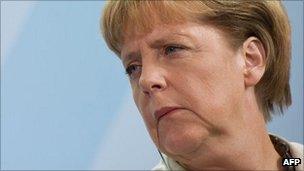Germany's Merkel suffers poll setback in Berlin
- Published

German Chancellor Angela Merkel faces national elections in 2013
German Chancellor Angela Merkel's ruling coalition has been dealt a blow after losing ground in Berlin regional polls.
Preliminary results show the Free Democrats, junior partners in the coalition, saw its support collapse, gaining only 2% of the vote.
Correspondents say the FDP's loss could make it more anti-euro and destabilise Mrs Merkel's government.
The polls come ahead of a key eurozone vote in parliament on 29 September.
Anti-euro stance
The FDP plunged from 7.6% in 2006 to 2%, falling below the 5% threshold needed to give them seats in the Berlin legislature.
The FDP's deputy party leader Christian Lindner described the result as a "wake-up call".
"We would be wise to show humility about this result. It's a low point but also a wake-up call. We knew it was going to be a difficult year and that's been dramatically confirmed," he told Reuters.
The SPD - who have been in opposition nationally since 2009 - won around 29% of the vote, down from 30.8% in 2006.
Mrs Merkel's Christian Democratic Union gained just over 23%, up slightly from 21.3% in 2006, while the Greens won 18%, up from 13.1%. The Left party vote fell from 13.4% in 2006 to 11.5%.
Meanwhile, the little-known Pirate Party, a libertarian party whose programme includes greater personal data protection and the legalising of cannabis, garnered more than 8% of the vote.
The Social Democrats already held control of the government of Berlin, but they are now expected to replace their current partners, the Left party, with the Greens.
The real bad news for Mrs Merkel's national government, he says, is the collapse of the vote of the FDP.
Our correspondent says the FDP's failure matters for the national government because there is a widespread belief that this haemorrhaging of support might push it nationally into a much more anti-euro stance.
Last week, national leaders toughened their rhetoric against German help for struggling eurozone governments.
If the FDP walked out of the national coalition on an anti-euro stance, Mrs Merkel's government would fall, our correspondent adds.
The vote comes less than a fortnight before a crucial eurozone vote in the parliament which will propose giving the European Financial Stability Fund (EFSF) more powers.
- Published10 August 2011
- Published27 March 2011
- Published28 March 2011